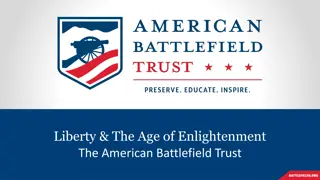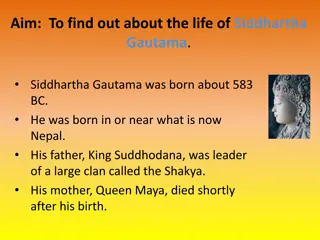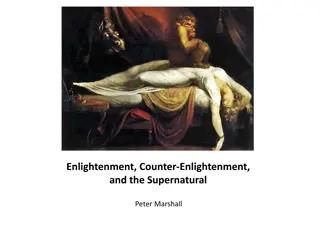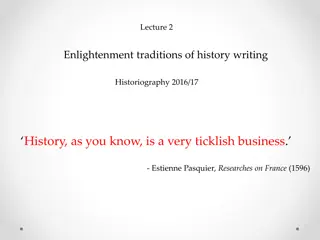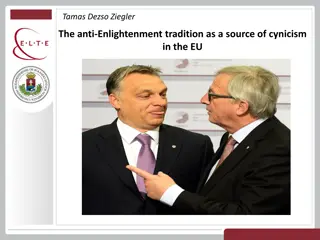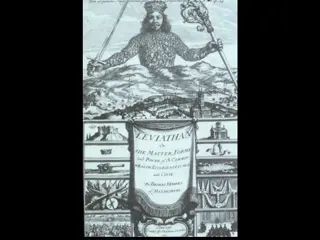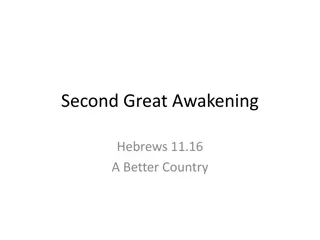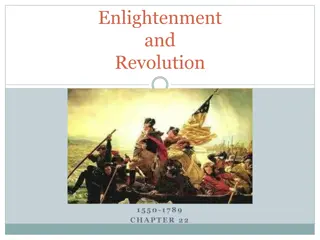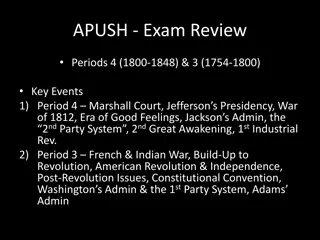The 1st Great Awakening, Anglicization, & The Enlightenment in APUSH
This content covers key concepts in APUSH related to the 1st Great Awakening, Anglicization, and the Enlightenment. It discusses the religious revival, emergence of new sects, Enlightenment ideas, Anglicization of the colonies, and Britain's mercantilism and imperial aims. The impacts on colonial society and interactions with European influences are highlighted.
Download Presentation

Please find below an Image/Link to download the presentation.
The content on the website is provided AS IS for your information and personal use only. It may not be sold, licensed, or shared on other websites without obtaining consent from the author. Download presentation by click this link. If you encounter any issues during the download, it is possible that the publisher has removed the file from their server.
E N D
Presentation Transcript
APUSH Review: Video #9: The 1st Great Awakening, Anglicization, & The Enlightenment (Key Concept 2.2, I, A-D) Everything You Need To Know About The 1st Great Awakening, Anglicization, & The Enlightenment To Succeed In APUSH Shoutout To Mrs. Payne s Class In Louisiana. Best of luck! www.APUSHReview.com
Pluralism Pluralism: Multiple groups living together English colonies were diverse - many European countries and regions - different religions Intellectual exchanges from different European groups
The 1st Great Awakening What was it? Religious revival in England and the 13 colonies Focus on the individual Key people: Jonathon Edwards - started the awakening John Wesley - helped found Methodism George Whitefield - great orator from England Transatlantic exchanges
Impacts Of The 1st Great Awakening New sects of Christianity emerged Methodists, Baptists, and Presbyterians Rejection of authority Helped to inspire rejection of British authority in the 1760s and 1770s
Enlightenment Ideas Questioning of government and divine authority Locke: Natural rights Montesquieu: Separation of powers Voltaire: Freedom of religion and speech
Anglicization What is it? Using more British norms and customs How were the colonies Anglicized? Colonial governments were based on English models Trans-Atlantic print culture - spread of ideas and goods via trade and newspapers Protestant Evangelicalism - George Whitefield from England came to America to spread message
Mercantilism And Imperial Aims Britain sought to promote mercantilism: Making $ for the mother country Britain wanted an imperial structure that was coherent and hierarchical Navigation Acts However, conflicts with colonists and Natives emerged Britain sought to limit expansion, especially post 7 Years War to avoid conflict with Natives
Colonial Resistance To Imperial Control Why did it occur? Colonial self-government: Certain colonists could vote for representatives, had no say in Parliament Ideas of liberty: Colonists saw themselves as British and wanted the same rights Enlightenment: Challenging traditional ideas of government Religious independence and diversity: Less of a focus on the Anglican Church, led to challenging authority in other areas Perceived corruption in the imperial system Corrupt leaders like Sir Edmond Andros of the Dominion of New England, he eliminated colonial assemblies
Quick Recap What is pluralism? What were the impacts of the 1st Great Awakening? 2 Key people from the Awakening? Enlightenment? 2 people? What is Anglicization? How did the colonies Anglicized? What is mercantilism? Why did colonists resit imperial control?
See You Back Here For Video #10: Slavery In The British Colonies And Slave Resistance Thanks for watching Best of luck!


